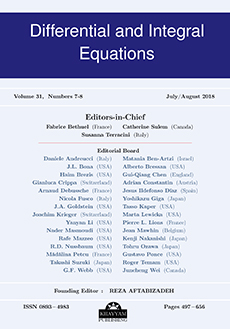Abstract
Let $(M,g)$ be a compact Riemann surface with no boundary and $u^*=(u_1^*,u_2^*)$ be a solution of the following singular Liouville system: $$ \Delta_g u_i^*+\sum_{j=1}^2 a_{ij} \rho_j \Big (\frac{h_j^*e^{u_j^*}}{\int_M h_j^* e^{u_j^*}dV_g}-1 \Big )=\sum_{l=1}^{N}4\pi \gamma_l(\delta_{p_l}-1), $$ where $h_1^*,h_2^*$ are positive smooth functions, $p_1,\cdots,p_N$ are distinct points on $M$, $\delta_{p_l}$ are Dirac masses, $\rho=(\rho_1,\rho_2)$ $(\rho_i\geq 0)$ and $(\gamma_1,\cdots,\gamma_N)$ $(\gamma_l > -1)$ are constant vectors. In the previous work, we derived a degree counting formula for the singular Liouville system when $A$ satisfies standard assumptions. In this article, we establish a more general degree counting formula for 2$\times$2 singular Liouville system when the coefficient matrix $A$ is non-symmetric and non-invertible. Finally, the existence of solution can be proved by the degree counting formula which depends only on the topology of the domain and the location of $\rho$.
Citation
Yi Gu. "Degree counting theorems for $2\times 2$ non-symmetric singular Liouville systems." Differential Integral Equations 34 (3/4) 183 - 198, March/April 2021. https://doi.org/10.57262/die034-0304-183
Information





